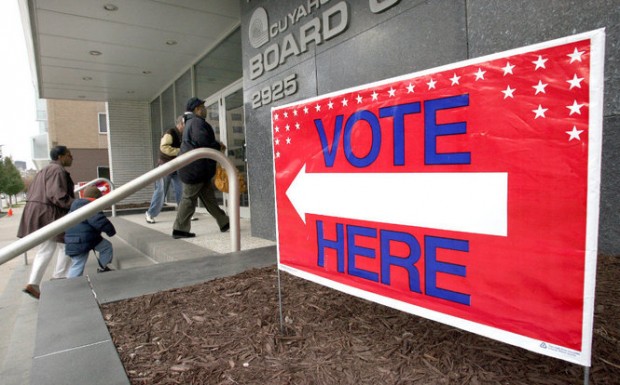CLEVELAND, Ohio — A federal judge on Friday said he will issue a restraining order against Donald Trump’s campaign and longtime adviser Roger Stone to avoid “harassing or intimidating conduct” at polling places on Nov. 8 Election Day.
U.S. District Judge James Gwin did not specify exactly what will or will not be allowed but said the order would likely be generic and prohibit both Democrats and Republicans from harassment of people entering and leaving polling places.
“It wouldn’t be any attempt to particularly identify as somebody being a Trump supporter or not,” Gwin said.
The judge also appeared unlikely to tinker with those poll observers whose names are submitted by each political party and are then approved by county boards of elections.
It also seemed like many of the actions he would forbid in his restraining order are already illegal, though the order could result in a contempt charge for anybody accused of violating it.
The decision came following a more than two-hour hearing. Gwin issued his written order Friday afternoon.
By Friday evening, Trump’s campaign had asked the 6th U.S. Circuit Court of Appeals in Cincinnati to review the order.
The Democrats filed a lawsuit Sunday against state Republicans, Trump’s campaign and Stone that said they fear that an aggressive presence from Trump supporters could discourage voters from the black community and other groups.
The judge said he will issue the restraining order against Trump’s campaign and Stone, who has not responded to the lawsuit and did not have an attorney present. He did not order it against the Ohio Republican Party, saying there was not enough evidence to show that a restraining order against it was needed.
Gwin also said the restraining order that the Ohio Democratic Party sought, which included disallowing Trump supporters from congregating and talking to voters 100 feet or more away from a polling place, was too broad.
Democrats filed similar lawsuits in Michigan, Pennsylvania, Nevada and Arizona.
As his election chances have faltered, Trump recently has repeatedly claimed the election is “rigged” and said his supporters should visit polling places to ensure integrity within the election. The lawsuit says such tactics are being encouraged in Democratic strongholds like Cleveland.
It also says Stone and his organizations have recruited volunteers to watch polling places. He’s also encouraged the so-called “protectors” to download and print out “official looking identification badges” and to livestream activities in November as they talk to voters about “election fraud.”
Elections officials from both parties, as well as independent experts, say that election fraud is very rare, and to the extent that it does happen, it occurs on a scale much too small to influence a national election.
While Gwin considered many issues during Friday’s hearing, he seemed most interested in Trump’s views on voter fraud, despite the overwhelming evidence that it is incredibly rare.
He seized on a quote Trump made at Aug. 22 rally in Akron, in which he said, “you’ve got to get everybody to go out and watch, and go out and vote. And when I say ‘watch,’ you know what I’m talking about, right?”
The judge asked Chad Readler, an attorney representing the Trump campaign, whether he actually believed, “as an officer of the court, that there is such a thing as voter fraud that impacts elections?”
Readler said after a bit of prodding, “Your honor, I don’t know. I’m not a political scientist and we’ve had elections that come down to coin flips because they’re tied. So in that race, if one vote was illegal, that illegal vote decided the race.”
Dawn Smalls, an attorney representing the Ohio Democratic Party, said that the people heeding Trump’s call “are not just citizens that are seeking to fulfill their civic duty.
“These are people that are specifically reacting to the racially tinged and racially charged language,” Smalls said “And that these are the people that are being fed to the state parties. Not, you know, Republicans of a normal year …”
The state Republicans, Trump’s campaign and Stone maintain that they have not done nor are planning to do anything illegal. Attorneys for Trump’s campaign and the Republican Party argued that a restraining order is not necessary because many of the actions Democrats say they fear are already against the law.
Trump’s campaign also said the restraining order the Democrats wanted would chill free speech and impede the campaign’s ability to perform certain get-out-the-vote measures.
Ohio Democratic Party Chairman David Pepper said in a statement that “with this decision, Ohioans can feel confident that they will be able to make their voices heard in this election.”
Ohio Republican Party Chairman Matt Borges said in a statement that he was happy that Gwin found that there was not enough evidence to specifically include the party in the restraining order.
The statement also says that the Democrats’ “eleventh hour publicity stunt backfired as the Hillary Clinton campaign is now also subject to the restraining order.” It does not note that the party’s actions, like many others, are also restricted by the restraining order.
Messages left for a Stone spokesman and Trump’s Ohio campaign staff were not returned.
Updated with background and information from Friday’s hearing.
Source: www.cleveland.com




